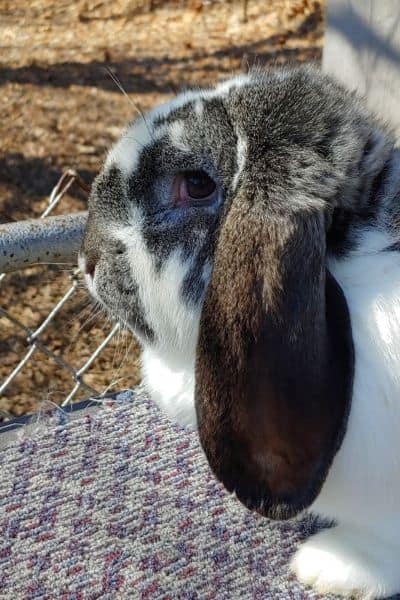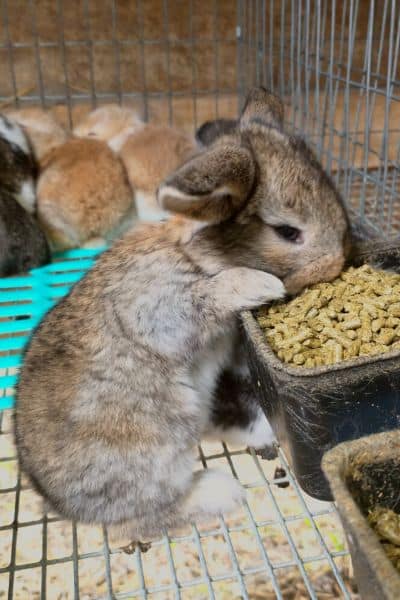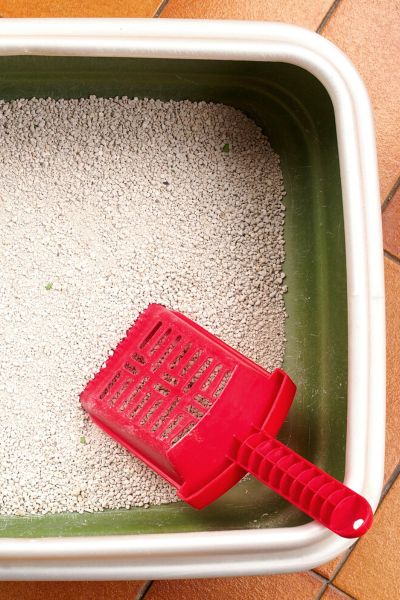Medicinal Herbs For Rabbits And Their Common Uses In Your Rabbitry
Using herbs for rabbits is still very new in the rabbit world and most people simply feed them for treats. This is fine but you also need to be careful if you raise rabbits for production of any kind on your backyard farm or homestead so that you don’t cause other issues unintentionally.
After having a rabbitry for 17 years you learn a few things. There are several health issues that can come up in rabbits and cause them to go down hard and fast.
And let’s be realistic unless you want to spend a lot of money taking them to the vet you have to find other options.
I started learning about herbs in early 2010. It never ceases to amaze me the amount of natural medicines most of us have right in our own backyards.

Let’s get into the details of how to use medicinal herbs for rabbits and look at some easy-to-find herbs that will be really useful for your rabbits.
Use Herbs For Rabbits As A Preventative
Always be thinking ahead and try to prevent issues rather than having to fix a problem. Giving herbs like lavender and comfrey to rabbits before going to events will help keep them calm and their immune system up. If they are going to be around other rabbits or animals in situations that are going to cause stress. Then using a preventative is a wise decision.
Rabbits have a very sensitive digestive tract and doing things to help prevent issues will pay off in dividends.
Herbs for Bloat/Digestive Disorders In Rabbits
Though bloat can be an issue at any age it is most common in young rabbits. Whether they are going to a new home, out for the day at a show, or they were a little stressed by a life change.
My top two herbs for issues like this are rosemary and lavender. They help keep the animal calm as well as aiding in digestion and keeping them moving internally.
When rabbits are getting ready to go to a new home I start feeding the herbs ahead of time. There is rarely a case of bloat that cannot be helped with these herbs. BUT if your rabbit is being fed enough fiber bloat shouldn’t be an issue to begin with.
Another common cause of bloat is feeding bad hay even if it does not look bad. Read this post to find out why I don’t feed hay to my rabbits.
Abesses
This is not something that is easy or fun to deal with but an abscess must be lanced. Then an antibacterial and anti-inflammatory applied to the affected area.
You can read all about how to treat an abscess here in this post as well as watch the video.
My top herbal treatment for this is adding Lavender essential oil to the wound daily until it is healed. Then I will add dried lavender to the rabbit’s feed if I don’t have any fresh leaves and stems from the garden on hand.

Learn more about treating abscesses in this post. – Need Rabbit Abscess Treatment FAST – At Home Treatment Step By Step Guide
Skin Infections
This is more for the cases when the rabbit has a weepy eye or moisture has stayed under the dewlap and caused a skin infection.
For this, I turn to essential oils. However, you could still make a tea out over almost any herb that has anti-bacterial properties with just as much success.
What Is The Best Natural Antibiotic For Rabbits
Rabbits can easily fall ill due to their sensitive immune systems. When rabbits get sick, it is crucial to provide them with appropriate medical treatment.
While we think of most antibiotics being prescribed by veterinarians you may be looking for natural alternatives. Which can be great if you are trying to handle as much of your animal’s care as possible on your own.
My first recommendation is Oregano. You can read more about it later in the post.
Another herb that I love, while not an antibiotic, works in a very similar way, and that herb is the ever-popular lavender. It is the herb I have the most experience with and has helped my rabbits out of a few different situations where I thought for sure they would have died.
Free Farm Goal Planner!!!
➡️Get my proven system for choosing your farm goals so you don’t get burnt out.
How Many Herbs Should You Have On Hand
You don’t need to have a ton of herbs on hand for rabbits. Choose 3-5 herbs max that are easy to get your hands on or are not hard to grow and stick with those. You don’t need 5 different herbs that do basically the same thing.
Here is a list of illnesses or health issues that would be good to have an herb to treat them with.
- Cure Of Inflammation
- Milk Flow Of Nursing Does
- Digestive Stimulant
- Aids in the healing of cuts
- A respiratory expectorant
- A Mild tranquilizer
- One that contains antibiotic properties
While it might seem like a lot lavender (which we all know) can cover most of these.
Now let me get into what these herbs can do on their own for your rabbits.
Lavender For Rabbits
Lavender is an herb that everyone has at least heard of right! It is the go-to herb and essential oil for most problems you have whether it is for humans or animals. This herb is AMAZING in what it can do. I will be just scratching the surface with this post on this awesome herb.
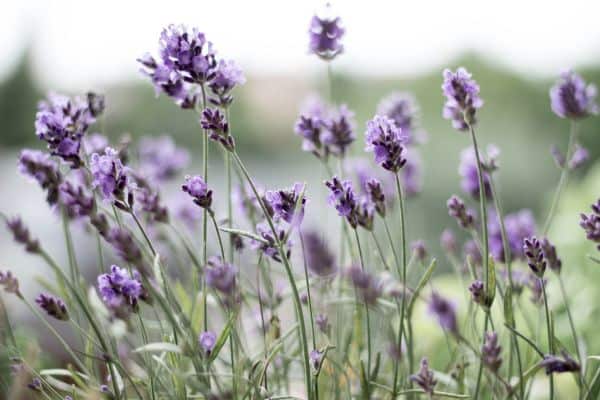
Main Uses
- Antidepressant
- Antibacterial
- Astringent
- Antispasmodic
- Anti-inflammatory
- Tonic
External Uses
There is not much Lavender won’t do. Lavender is a great disinfectant of wounds, bites, rashes, skin infections, and small cuts. Its anti-inflammatory properties make the injuries less painful. In these situations, I like to keep lavender essential oil on hand.
Internal Uses
It is recommended for calming animals that are going through emotional trauma as well as behavioral training that might cause some stress to the animal.
In these cases, dried herb fed to the animal on its feed is best. However, if the animal will not eat the dried herb make the Lavender into a tea and add it to their water before trying the Lavender essential oil.
In emergencies when the animal is acting out and it could cause harm to itself or others using the essential oil is advised. Rub the oil on your hands and try to rub some on the animal’s nose and cheekbones to help the animal inhale the scent of the oil.
Lavender is very easy to grow but does best with lots of sun.
Other Uses
Depending on what you want to do with it depends on the form you should use. For issues like rashes, bug bites, and minor injuries, diluted essential oil or salve would work the best. If you want the calming effect take Lavender as a tea or for herbivores the dried herb is also a great choice.
Risk warnings – Avoid using undiluted oils on animals with kidney problems.
If you want to learn more about lavender and how I use it in the rabbitry read this post.
Chamomile
Chamomile is a very well-known plant that people only think of as calming. It is so much more than that. The herb is definitely a must when it comes to having affordable herbs on hand for the care of your animals.
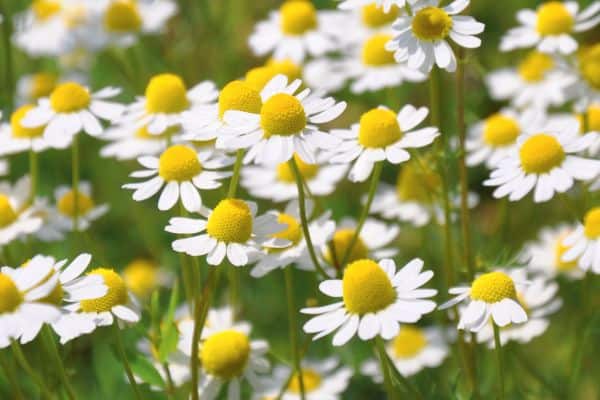
Main Uses
- Anti-inflammatory
- Digestive Aid
- Mild Warmer
- Mild Sedative
Common Uses For Chamomile
It is often overlooked as a pain relief agent. Its sedative properties are mild, but this makes it a good choice for a nervous rabbit or other animals going on long car rides that might cause animals to get restless. As a tea, this herb is good for calming upset stomachs and vomiting brought on by nervousness and hyper-excitability.
Chamomile has a very high component of anti-inflammatory which is often overlooked. It would be very beneficial to salves and sprays for calming rashes. Its anti-inflammatory properties are helpful in reducing inflammation caused by fleabites and rashes from contact with a substance the animal is allergic to.
The plant is a very effective digestive remedy and aid and is safe for young animals. However, it should be avoided by animals with high allergies to ragweed.
Though it is a slow wormer chamomile does work and should not be overlooked. It is safer than the other fast-acting wormers and it can help counteract the effects that the parasites have had on the animal.
Chamomile works as an eyewash, make it a little stronger then you want to drink and strain the substance through a coffee filter. Syringe into the eye.
This herb is very easy to grow and will sometimes take over if not controlled. It can grow in great soil or hard clay-filled soil.
Risk warnings – Chamomile is safe but should be limited in pregnant animals because it can cause re-absorption in some animals and inhibit fetus growth.
Comfrey In The Rabbitry
This herb is extremely useful and will help any animal owner out there. Personally, I have had a wonderful experience adding Comfrey with lavender to the rabbit’s feed when going someplace like showing at a fair. It kept my rabbits on their feed and eating normally while also helping them stay calm.
Main Uses
- Heals Wounds
- Anti-inflammatory
- Astringent
- Expectorant
- Lubricates and soothes mucous membranes.
Comfrey – This will help speed healing, aiding in bone formation if made into a poultice. Feed dried or fresh herb to give ill animals a pick-me-up. Works well for stressed and weak rabbits. Try comfrey with rabbits that are off their feed. The herb also has a slight calming effect on rabbits works as a digestive aid and helps with wool block. Comfrey can be applied to bruises and sprained areas as a paste or poultice.
For burns, abrasions, lacerations, fleas, or other insect bites comfrey should be one of the first herbs to try. Comfrey can be made into a paste or you can use the extract.
If using comfrey on an open wound in an extract or poultice an antibacterial herb should always be added. This herb has been known to heal up a wound so quickly that it can close an infection inside the body at the injury site. Adding herbs such as thyme, Oregon grape, Saint johns wort, or lavender is recommended.
Risk warnings: Fresh plant use is not recommended for internal use over a long period (several months). Due to the levels of PAs which is known to cause liver damage if enough is ingested. However, the dried herb has almost no evidence of the toxic PA. In extreme doses, comfrey can cause diarrhea. Hence it is best to feed dried herb to herbivores that are susceptible to runny stool.
Calendula
Calendula is a wonderful herb, it should be one of the first herbs to go to when you find minor injuries on your animals if you have it on hand. The herb is also extremely helpful for humans as well. I used it for my family as well as livestock.
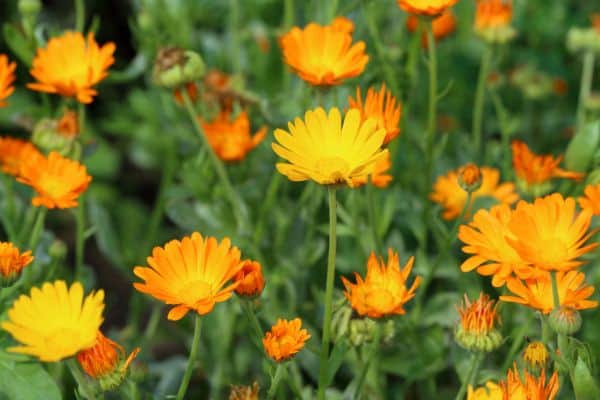
Main Uses
- Anti-inflammatory
- Heals Wounds
- Astringent
- Antibacterial
- Antifungal
- Anti-tumor
- Liver stimulant
Uses – A calendula salve with at least 5% herb content will prove to be helpful to any medicine cabinet. The herb can be used on rashes, insect bites, and abrasions. The salve will also help heal minor injuries and surgical incisions. An external application will drastically help reduce swelling and pain from injury.
A warm water infusion will help soothe skin from many different forms of dermatitis caused by flea bites, eczema, and poison ivy. A cool Calendula tea-soaked rag would help speed healing and bring relief to burns as well.
Risk Warnings – Calendula is one of the safest herbs to use. However, it has been shown to cause abortion-causing activities in rodents and other small animals. This herb should be avoided during pregnancy for small animals.
External use of calendula should be fine on animals larger than 10 pounds. The herb also contains salicylic acid and is potentially toxic to cats.
Calendula is easy to grow but is an annual in the northern states.
DANDELION
Dandelion is a preventative herb as much as it can help solve problems. However with rabbits because of its laxative properties, I would not give the plant to your rabbit more than 4-5 times a week.
WARNING: With dandelion being considered a weed in most countries you want to be careful picking the herb and feeding it to your animals. It could be sprayed with a herbicide and could kill your animal on accident.
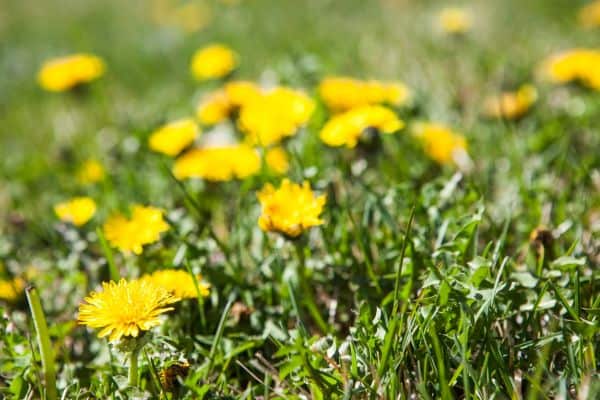
Main Uses Of Dandelion
- Stimulates the liver
- Stimulates salivation and improves digestion
- Laxative
- Anti-inflammatory
- Tonic
Dandelion is a plant that can help rabbits stay healthy in many ways. The leaves and flowers can make a weak tea that helps clean the blood and make it healthier.
The root of the dandelion helps with bladder infections and diarrhea, which can make bunny feel better.
Rabbits can eat dandelion greens, which are full of vitamins and minerals to help keep them strong and healthy. They can help bunny’s immune system fight off bad germs and keep their tummy working well.
Oregano In Your Rabbitry
Oregano is a great herb for any level of herbalist.
Main Uses
- Antibacterial
- Antibiotic
- Antispasmodic
How To Use Oregano With Your Animals
Oregano has high amounts of antibacterial properties which would be extremely helpful in emergencies. The herb can be given internally, dried, or fresh.
I like to keep some fresh and then dry what is left in the fall to have some through the winter. And if you don’t use it all you can add the extra herbs to your meals.
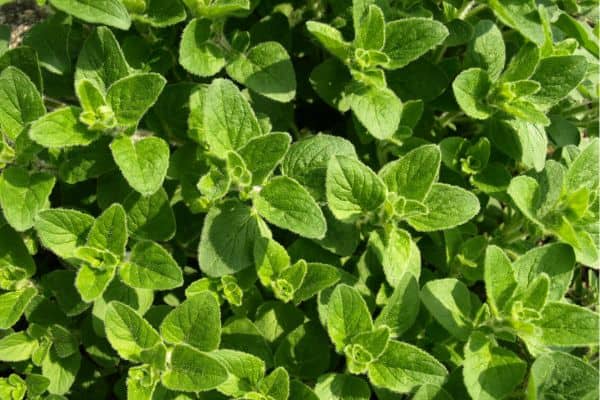
It can also be made into a poultice or tea at the first sign of infection which works great if you are trying to heal a wound. But for rabbits, you will see the best results and have the easiest time trying to feed it to them fresh herb.
Oregano has antispasmodic properties that help to calm nerves for animals who have a fear of something such as car rides or other objects. It would also be helpful to calm a coughing spasm. However, I do like lavender for this type of issue instead.
The herb also expels internal parasites and is a natural insect repellent.
You can use the oils but be sure to dilute the oil before using it.
Make sure you don’t put the herb into hot of water or in any other preparation you are making. The extreme heat will take out most of the beneficial properties.
Growing Oregano
Oregano is a perennial and VERY easy to grow so make sure you want it where to plant it. Even a small sprig of roots will come back into a plant if given the chance. Oregano does well in all light settings and grows like a ground cover. Meaning it will grow up and once it hits 12″ or so it will fall over and start to root itself from that fallen sprout.
Risk Warnings: Should be used with caution in pregnant animals.
Where To Buy Oregano
You can buy the dried herb for a reasonable price on Amazon if you don’t want to grow it yourself. If you keep the herb in an airtight container it will keep for at least a year.
If you want to learn more about this herb read this post about oregano in the rabbitry.
PAPAYA
Papaya enzyme tablets can be used to help prevent wool block in rabbits. Rabbits love them and are like treats for rabbits, and they help keep their digestive system healthy. Now I have said before how sporadic I am with rabbits and giving them treats. Rabbits can get stubborn and want to only eat that one particular thing and even go on strike refusing to eat their own feed. So be careful giving these tablets too often.
Rabbits can sometimes swallow too much of their own fur while grooming, especially when they are molting, which can cause a blockage in their gut. This can make them sick, but papaya enzyme tablets can help prevent this.
The tablets work by breaking down the hair in a rabbit’s gut and keeping things moving. You can buy these tablets at health food stores or online. When giving the tablets to your rabbit, follow the instructions on the tablet bottle to make sure they get the right amount.
It’s important to know that papaya enzyme tablets should not be used as a replacement for a balanced rabbit diet. And if your rabbit is already sick or has a medical condition, talk to a vet before using these tablets.
PLANTAIN
Here is another useful weed that we all have in our yards. It always amazes me the usefulness God gave us right in our own yards.
Main Uses
- Lubricates, soothes and protects internal mucous membranes
- Anti-inflammatory
- Stops Bleeding
Plantain is an herb that can be really helpful for people and animals.
One cool thing about plantain is that it can help fight off bacteria for a cut or minor skin abrasion.
Plantain can be a great snack or treat type herb that can also help with their digestion and help with gastric inflammation. If a rabbit has a little cut or a bug bite, you can make a special cream with plantain to help it feel better.
Rosemary
Rosemary is an herb that I highly recommend you have on hand if at all possible. It is not an expensive herb and is massively helpful in emergencies. It is a great help for me to get my rabbits to eat gain if something has caused them to go off feed. There are a lot of uses for rosemery and is great to have on hand to solve lots of different problems.
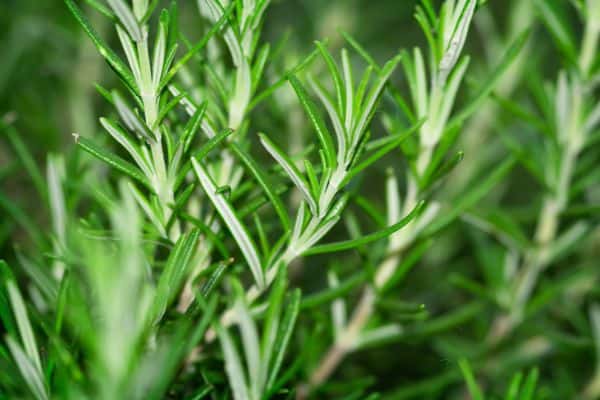
Main Uses
- Tonic
- Antidepressant
- Stimulant
- Analgesic
- Expels intestinal gas
- Antispasmodic
- Promotes menstrual discharge
- Astringent
- Antioxidant
- Antimicrobial
- Insect Repellent.
Uses
I can not say enough in favor of this herb. It is extremely useful in animals that are prone to nervousness, excitability, and irritability. Give rosemary to animals that are recovering from a fearful, traumatic experience or shock.
It also does wonders for animals who are prone to bloat. If livestock such as rabbits, goats, and sheep are going to a new home it is definitely worth feeding rosemary for a few days before the animal goes to its new home.
Give 1/8 Teaspoon of tincture orally for every 20 pounds of the animal’s body weight up to three times daily. Herbivores can be given 1 tablespoon for every 5 pounds of body weight. Or about 5 inches of the fresh plant for every five pounds up to three times per day.
Risk Warnings
Not recommended for pregnant animals. It could cause a miscarriage.
To learn more about rosemary and how I use it in the rabbitry read this post.
Start Slow With Herbs
Herbs can do great things for your rabbitry. They have gotten my rabbits out of the woods far quicker than I would have been able to take them to a veterinarian. They have also saved me a lot of money in the process.
It might feel overwhelming at first to learn all of these herbs but start with just a few, learn how they work, and if you find the need to at more then do so.
Just like essential oils, it can be tempting to have a cabinet full but it’s really not necessary. But you really don’t need to have a ton of herbs. Many of them do the same thing just in different degrees.
Have you tried herbs with your rabbits? Tell me about it below.
![Rabbits Do NOT Need A Companion Rabbit [here’s why]](https://leah-lynch.com/wp-content/uploads/blog-post-header-31-768x1152.jpg)

![How To Stop Rabbits Fighting [Signs Of Aggressive Behavior]](https://leah-lynch.com/wp-content/uploads/blog-post-header-29-1.jpg)
